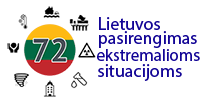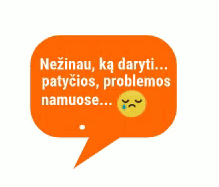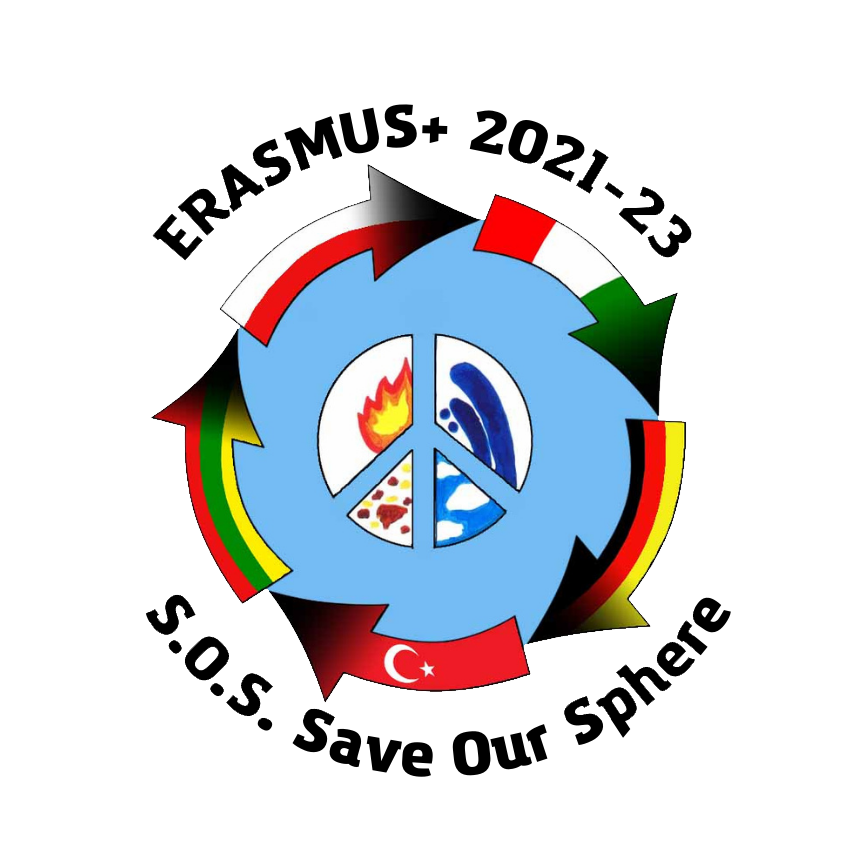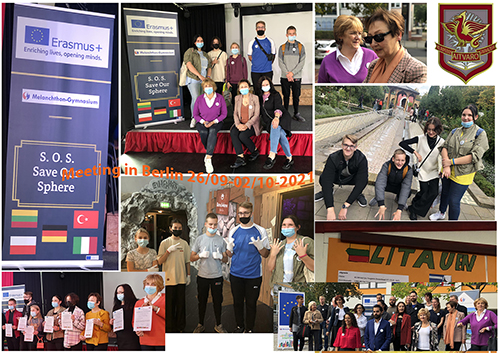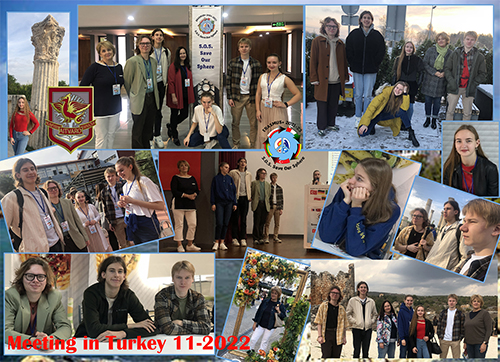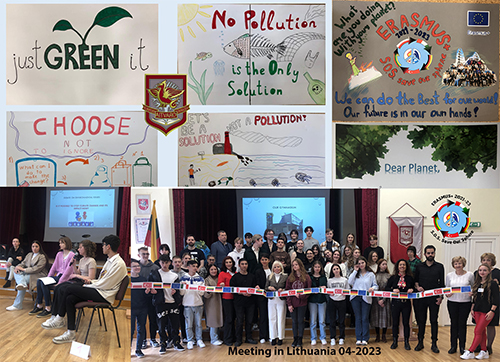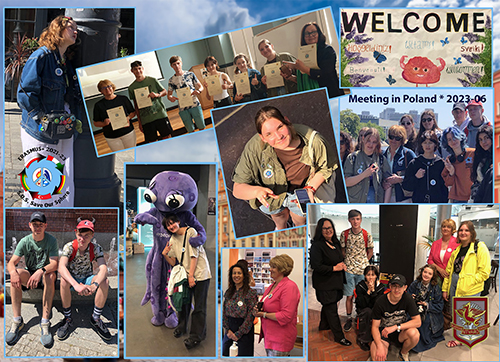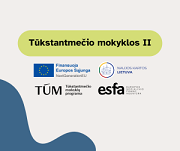Partners:
Melanchthon-Gymnasium-Berlin, Deutschland:
https://www.melanchthon-schule-berlin.de/
IISS Ettore Majorana Bari, Italien:
http://english.iissmajoranabari.it/index.php/component/users/?view=reset&Itemid=101
Klaipedos "Aitvaro" gimnazija, Litauen:
https://www.aitvaras.klaipeda.lm.lt/
Evliya Celebi Mesleki ve Teknik Anadolu Lisesi, Türkei: https://evliyacelebimtal.meb.k12.tr/
Liceum Ogolnoksztalcace nr VII im.K.K.Baczynskiego we Wroclawiu, Polen:
About Our Project
Climate change is undoubtedly a reality that affects us as a society nowadays. Considering the fact that in order to achieve a global change in this matter, we have to start locally and above all start taking small steps to gradually produce a change of mentality that will result in a greater environmental awareness in people’s behavior. Regarding this premise and taking into account the relevance of the “Fridays for future” demonstrations for our students, we have decided, as an educational community, to take these ideas and put them into practice, and thus take small steps from our school towards a global movement. Therefore, we want to create and implement a climate protection plan adapted to each school and each reality. Specifically, this means that five countries (Germany, Italy, Lithuania, Poland and Turkey) will participate in the exchanges, in each of them, the host school will propose a measure that can be applied in the school, for example, how to handle with waste separation or how to reduce water consumption or how to foster regional product consumption and so on. During the time between exchanges all schools will test and discuss whether this measure could be applicable to their school and reality. So at the end of the whole project there will be five measures available, of which at least two must be applied in the schools. If possible, the second measure should be taken out of the five available ones. The two measures and their explanation will be brought out in a brochure to be available for the whole school community. In total, about 40 people are going to participate among students and teachers. The exchanges will be extended over a period of 24 months. Communication will be carried out through digital media, e-Twinning and e-mails, that will allow the formation of international teams to do the following activities: exchange on success and problems about the concrete measure chosen by the schools. The language used as a means of communication will be English which will lead to improving the language competence among the participants and to bridging the gap between cultures by using it as a means of communication.
HISTORY OF KLAIPEDA WATER – SUPPLY SYSTEM
EN
The company's history began in 1902 when a Lithuanian newspaper “Lietuviška Ceitunga" published an article entitled “City Festival“. The article spread the news that the inauguration of water supply was coming.
At that time, a place in Liepų Street was selected for the water supply company. It was located near the gas plant and built in the middle of nineteenth century. In this way, the city zone of public utilities continued to expand. The water supply complex consisted of a water-tower, pumping, aeration and filter buildings, and a transformer station. In particular, the unique water-tower became a highlight of the northern part of the city.
In the 19th century, in the old town of Klaipėda, water from wells was quite bad. The Head doctor of the city F. J. Morgen wrote in his book, "Local people take water from public wells, but there are only a few, which are properly installed. The water from the river is unsuitable for human consumption, because the winds mix Danė’s water with sea water." With help from state funds in 1876-1877 a borehole was drilled near Klaipėda, in Purmalių village. Previous results from a borehole water analysis gave hope that good water could be found in Klaipėda. After long negotiations with the authorities, in 1898 what is now Liepų Street in Klaipėda, became the location of a new water borehole. However, it was not a water supply company yet, that required different constructions and mechanisms. Eventually, Klaipėda water tower and water distribution system were both laid down in 1901, and a year later, on August 2nd, Klaipėdos Vanduo was solemnly inaugurated.
International meeting in Berlin
After almost 2 years, the activities of international projects have been renewed. And we didn’t miss this chance! At the end of September 2021, a group of our students (Maksim Kornilov IIIb, Aleksandr Ščiur IIIb, Sofia Jugaj IId, Alexandra Litvinenko Ia, Amelija Permenova IId) together with teachers (Diana Mineikiene, Natalia Domnenko) and principal Irina Fiodorova went to Berlin (Germany).
Project participants (Erasmus Plus project "Save Our Sphere" (S.O.S) from Germany, Italy, Poland, Turkey and Lithuania gathered in the German capital to raise awareness of global environmental issues. Working according to the plan of the project, the students tried to immerse themselves in the world situation.
It is gratifying that it was time not only to work, but also to get to know the city, to climb the observation deck of the Berlin TV Tower (368 m) (207 m), to visit the modern Futurium museum, where you can think about how we will live in the future, and so on, communicate with partners and their families.
2022 In April, if the epidemiological situation is favorable (we all really hope so!), all partners will gather with us in Klaipeda.
Bari, Italy
The 2022-2023 school year began with a trip to Italy (Bari). From October 8 to October 14, we and our partners worked on a project in this city. This city is comfortably located on the heel of an Italian “boot”. Medieval castles, walls, an old fort, narrow winding streets, sandy beaches of the Adriatic Sea opened up to our eyes. In this city there are the relics of St. Nicholas the Wonderworker - one of the most revered saints among both Orthodox and Catholics. This gives the city a special charm. We were infinitely glad to meet with partners after a long break. We worked on the project, enjoyed the sights and planned our next meetings.
Mersin, Turkey
At the end of November 2022, the next meeting on the project took place in Mersin in Turkey, located on the Mediterranean coast, but not a tourism center. It is a city with a very ancient history, dating back to the ninth millennium BC. Mersin has been part of many civilizations throughout its very long history: Assyrians, Persians, Greeks, Romans and Byzantines. Today Mersin is a large city stretching along the coast, with skyscrapers, huge hotels, and large shops. In a very warm atmosphere, we got to know the city and held many events related to the theme of our project. For example: workshop on recycling and presentation of the materials made at the workshop, visit to Arbella (Pasta, grains and pulse factory, Cultural and Historical visit to Viranşehir, Silifke and so on.
Klaipeda / Lithuania
At the end of April 2023, a meeting on the project took place in Klaipeda. 5 working days of the meeting flew by. The families of students of the Aitvaro gymnasium, who hosted one, two or even three guests, deserve our thanks and highest respect. We paid all our attention to the theme of the project in order to once again emphasize the importance of caring for our nature. Working in mixed groups, improving their knowledge of the English language, the students drew advertising posters calling for the protection of nature, participated in real debates, sorted garbage in a relay race, and even wrote a letter to planet Earth, the words of which were sometimes very touching. We showed the guests our city, neighboring Palanga and enjoyed every minute of the meeting.
Wroclaw, Poland
The first week of June 2023, the project participants spent in the Polish city of Wroclaw, where partners from Germany, Turkey and Italy also arrived. This was the final meeting on the project. And only this thought overshadowed our stay in a cozy city with hundreds of small bronze statues of dwarfs, which have already become an integral part of this ancient city.
The last meeting on the project is always a very responsible meeting. We summed up the project, evaluated it and participated in the events scheduled for this meeting. For example, we visited Hydropolis - Water knowledge centre - in order to improve knowledge about the possibilities of reducing water consumption and the gene bank in Kostrzyca. Kostrzyca Forest Gene Bank is conducting an innovative project concerning the identification and storage of DNA of the most precious plants within the Białowieża Forest area. These were very interesting visits.
